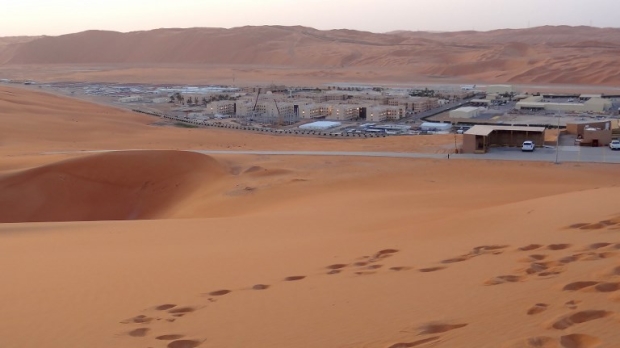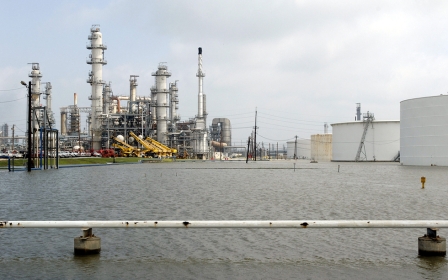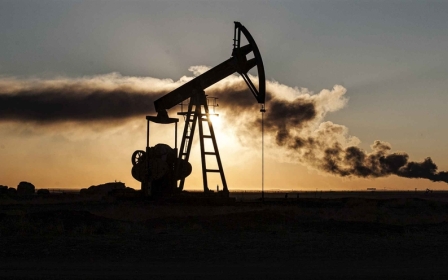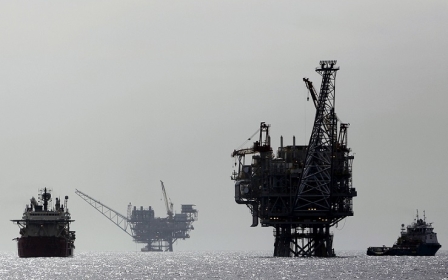ANALYSIS: Saudi oil poised to reap rewards of US withdrawal from Iran deal
Saudi Arabia is poised to reap the windfall of higher oil prices and increased production with the US withdrawal from the Iranian nuclear agreement, say analysts.
A day after Trump's announcement that the United States would withdraw, the price of oil reached $77 a barrel, a three-and-a-half-year high, on worries that the US pullout and new sanctions would escalate regional tensions and restrict Iran’s oil supply. On Thursday, it climbed to $80.
'The Saudis in particular are enjoying the oil prices we have right now. We hear that the Saudis need oil prices north of $80 and maybe a little higher to balance their budget'
- Samantha Gross, Brookings Institution
European governments, who fought and failed at the last minute to convince Trump to stay in the 2015 nuclear agreement, have said they are exploring counter-measures to protect against US secondary sanctions, which will target anyone doing business in Iran.
"Do we accept that the United States is the economic gendarme of the planet? The answer is no,” French Finance Minister Bruno Le Maire said.
"Do we accept the vassalisation of Europe in commercial matters? The answer is no."
But despite their efforts, a huge swathe of oil and gas deals signed by European companies since sanctions were lifted in 2015 have been thrown into doubt.
On Sunday, US National Security Adviser John Bolton warned the companies that they could face sanctions if they continue to do business with Iran.
After their first meeting on the matter, European Union leaders agreed to maintain economic cooperation with Tehran.
Analysts predict that between 500,000 and 700,000 barrels of Iranian crude per day could be taken off the market as a result of the US withdrawal.
But they also said that while the full sanctions on Iran - which cover everything from cars to Persian rugs - will hurt, with only the US backing them Tehran will probably shrug off sanctions on its oil industry.
China, India and Turkey, which are the first, second and fourth largest buyers of Iranian crude respectively, may keep buying at current levels by skirting US sanctions on purchases in dollars, using local currencies instead.
“It's been done before, oil has been traded even under the most severe sanctions regime on Iran,” said David Butter, a Middle East energy analyst at think tank Chatham House.
“Whether it’s through euros, through some sort of barter arrangements… there are ways around it.”
'Cash helps'
Samantha Gross, energy fellow at the Brookings Institution, said that the latest sanctions will have less effect on Iran’s oil industry than the 1 million barrels per day that Iran lost last time sanctions were in place.
“Last time, there were sanctions on the Iranian oil industry, they were really universal. Everybody was in on it. Countries all over the world significantly reduced their purchasing of crude oil from Iran,” said Gross.
It can be turned on quite quickly and there’s more that it could bring onto market after about six months, so there’s no other country that is really in that position to ramp things up
- David Butter, Chatham House
“We don’t expect that this time. The reason being the way [the US is] unilaterally putting sanctions on Iran and pulling out of the deal.”
Instead, the main effect could be a boost to Saudi Arabia’s oil industry, as it sees an opportunity to increase production to cover the lack of Iranian supply at a time when prices are higher.
On Friday, a day after Brent crude hit $80 a barrel, the kingdom's energy minister said he was consulting with other oil producers in and outside OPEC to ensure there are adequate supplies globally.
A 2016 deal between OPEC and other big oil producers like Russia saw them reduce production in order to drive up prices. Any missing Iranian oil that results from US sanctions will provide them a reason to increase production, and analysts say Saudi Arabia is best placed to do so quickly.
“Saudi Arabia is in a unique position because it has a lot of spare capacity,” said Butter.
“Much of it can be turned on quite quickly and there’s more that it could bring onto market after about six months, so there’s no other country that is really in that position to ramp things up.”
But the Gulf kingdom, which is currently undertaking an ambitious reform project to diversify its economy, won’t rush to increase its output while it can reap the rewards of a high oil price, said Gross.
A high oil price will help finance those ambitions, said Gross.
“The Saudis in particular are enjoying the oil prices we have right now. We hear that the Saudis need oil prices north of $80 and maybe a little higher to balance their budget,” she said.
“If you look at what they are trying to do in Vision 2030, cash helps. They are trying to make a tonne of new investments and creating new industries - and they need money for that.”
‘What exactly is the end game?’
Finances aside, Washington’s withdrawal from the Iran deal has also helped Saudi Arabia score a geopolitical victory over its foe Iran.
The two countries are on opposite sides of a range of proxy conflicts across the Middle East, and Saudi Arabia has long argued for an end to the Iran deal.
“At the moment it is a very nice windfall for [Saudi Arabia]. Geopolitically everyone is ganging up on Iran, which is what they wanted. The oil price is higher and it looks like increased demand will mean increased exports of Saudi crude are coming,” said Butter.
“But where you have a problem is what’s this all ultimately aimed at achieving, what exactly is the end game?” he added.
While some commentators see the US and Saudi Arabia's long-term strategy as using economic sanctions to harm Iran’s ability to exert regional influence and to foment unrest in the country that might lead to the overthrow of its rulers, Butter questioned the likelihood of either happening.
“There’s not a point at which you can say what level of oil exports will lead the Iranian economy to collapse, because it doesn’t work like that,” he said.
“It will be severe but they have had to live with this before.”
Instead, the outcome would likely be that hardliners in Iran double down on a commitment to a nuclear weapons programme and an involvement in regional conflicts, said Jim Krane, a Middle East energy analyst at the Baker Institute.
“The lesson that many in Iran will take away from this is: when you make political compromises it just comes back to hurt you,” he said.
Iran “is going to double down on their involvement in Iraq… Syria, Lebanon and Yemen. I think we are going to see more Iranian attempts to gain influence rather than less. I think that is now one of their strongest cards.”
New MEE newsletter: Jerusalem Dispatch
Sign up to get the latest insights and analysis on Israel-Palestine, alongside Turkey Unpacked and other MEE newsletters
Middle East Eye delivers independent and unrivalled coverage and analysis of the Middle East, North Africa and beyond. To learn more about republishing this content and the associated fees, please fill out this form. More about MEE can be found here.






